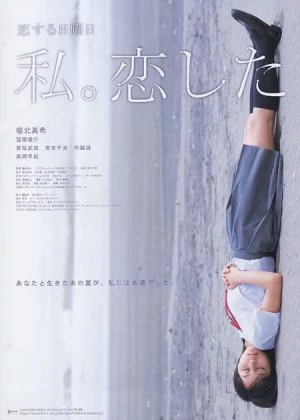Love on Sunday: Last Words

Ryuichi Hiroki's winning streak continues. After seeing New Type, Girlfriend and Kimi no Tomodachi I am once again charmed by his tender sense of direction. Last Words is a very typical and somewhat "safe" Hiroki film when overseeing his oeuvre, but I'm sure most fans won't really mind. Both a good entry film for novices and a true crowd-pleaser for lifelong fans. That is, if you can actually speak of crowds when considering Hiroki's fanbase.

Last Words is an unrelated sequel to Love On Sunday, an earlier Hiroki film. While it doesn't bear immediate similarities in characters, setting or story, there are some strong parallels in themes and flow so fans of the original should do well to check it out. That said, it is perfectly watchable without having seen the first film as Last Words stands completely on its own.
The film revolves around death, acceptance and making the best of your remaining time. Nagisa is diagnosed with cancer at age 17, a disease that killed her mother one year earlier. When she asks her dad how much time she has left a telling silence follows. Nagisa acts immediately and returns to her home town which she had to leave three years earlier, visiting a childhood friend (and secret love).
Rather than tell him the sad news and start a trip of mourning and sadness, she hides her condition and tries to enjoy his company as much as she can. Things get a little sour though when she finds out Satoshi is hooking up with another woman, one that's married and already has a kid of her own. She tries to intervene yet ends up ruining her relationship with Satoshi.

On the visual side Last Words is what you'd expect from a Hiroki film. Lots of handycam work mixed with well-formed, agreeable yet far from mind-blowing shots. Still, Hiroki knows to paint quite a picture using just handycams. Lovely play of light and smart camera movements help to transport you into the actual scenes, feeling those same little joys the characters are experience. It's really the key to the quality of his films.
The music is once again a collection of subtle piano music interwoven with (quality) J-Pop. It remains a weird combination, especially for a director of subtle, human dramas, but it does give his films some extra identity. The J-Pop is decent enough not to irritate, the piano music might be a bit more fitting but can come off a little too safe at times.
The acting is overall great, as could be expected. Horikita and Fukikoshi both put in excellent performances and are given enough room to shine. The bus ride near the end of the film is superbly acted, something you would hardly expect from actors this young. Another one of Hiroki's fine yet subtle gifts.

The dramatic climax on the bus is impressive, one of the best scenes I've seen in any Hiroki film so far. One can only guess how much Satoshi suspects of Nagisa's illness, but the double layer present in this scene is absolutely heart-warming. While essentially a sad and dramatic goodbye, there's a unique feel-good vibe that runs throughout the entire sequence.
In the end though it's a different scene that makes me appreciate Hiroki's cinema all that much. There's a passage were Satoshi and Nagisa climb a firehouse. Once on top the blue seashore reveals itself, wind is blowing strong and the sun is shining bright. Even though I'm watching this film in the winter, 08:00 in the morning I'm right there with the characters and enjoying the feel of the wind and sun as much as they are. That's what makes Hiroki's cinema so great.
For Western audiences the themes of Last Words may be quite sad and depressing, but Nagisa's acceptance of her nearing death paints a very different picture. What drives this film is joy, contentment and happiness. Enjoying what you have left and dealing with whatever comes your way. That doesn't mean there isn't sadness or loss here, but people just deal with it and leave it behind. Once again a lovely drama from the hands of Hiroki, quality assured.